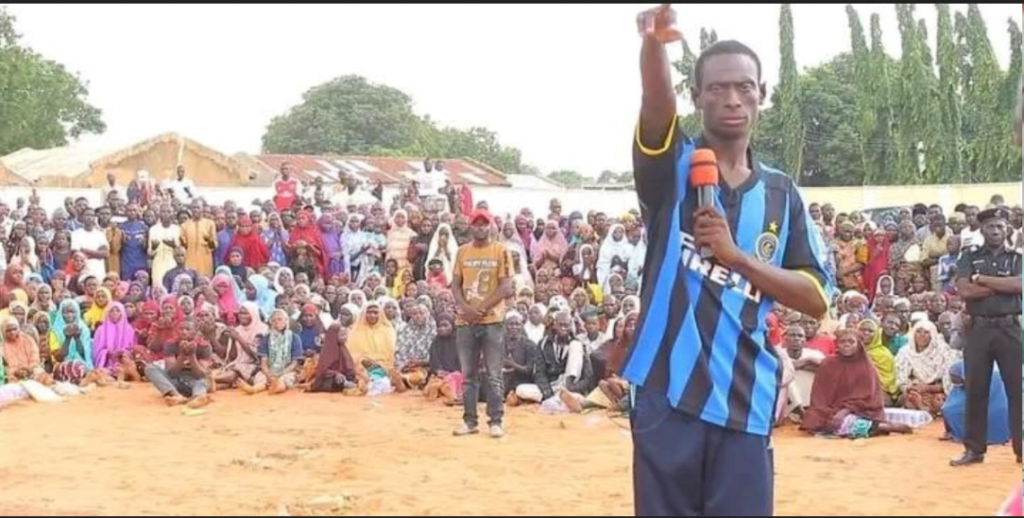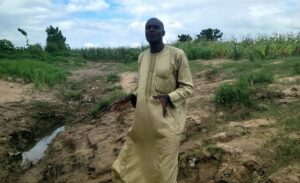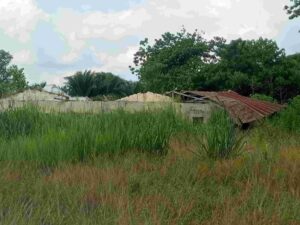For years, Hassan Patigi, a preacher and exorcist from Patigi community in Kwara State, has been touring many towns and villages in Nigeria on a self-imposed mission to heal the sick and save the poor. However, his quest has left a trail of abuse, especially in villages across two North-Central states, Niger and Kwara. During his crusade, he orders the torture of men and the public humiliation of women, accusing them of witchcraft. Alongside these unlawful acts, he extorts money from the victims, causing division and disgrace within the families affected. In this investigative report, Yunusa Umar of WikkiTimes exposes the atrocities committed by another self-proclaimed ‘Man of God’ in Nigeria, showing a disturbing pattern of rights violations of the Nigerian citizens without any apparent sanctions from government authorities.
Hassan Patigi, a self-acclaimed preacher and spiritual healer, has been organising crusades in various communities in the north-central region of Nigeria where he invites people for spiritual healing and financial liberation. Patigi would fervently pray over sachets of water and instruct his devoted assistants to distribute the sachets to people suffering from various diseases and afflictions. The list of people who regularly attend Patigi’s crusade includes the blind, the deaf, the lame and women seeking the fruit of the womb. A few minutes after drinking the water, some persons would troop out to claim transformative healing experiences that were invisible to others.
Many visits, but no healing
Audu Suleiman, a native of Mokwa local council of Niger State, was one of those who sought help from Patigi. His legs have been paralysed since 2016 and confined to a wheelchair. So, he visited Patigi’s healing centre for healing, but his several visits did not bring him succour.
“I visited his healing centre three times, but no healing happened. He would tell the people with paralysed legs to stand up, but I never did,” he told WikkiTimes.
During the crusade, the healer points finger to the people seeking help at his miracle centre, claiming to be hunting for witches who were on the mission to kill him and other people in the crusade. Nna’ba, a woman from Bukka, a few kilometres away from Mokwa, was completely disgraced in the public on the allegation of witchcraft.

Another victim of the exorcist is Alhaji Saba Alheri who lost his vision to glaucoma. Pa Alheri, 76, had just finished Asr (evening prayer) when WikkiTimes visited him. The reporter met with him sitting on a Sofa and counting the rosaries.

“I went to his centre several times, but nothing happened. I had to later resign my fate to my creator. He gives and takes everything. Whatever comes to me, God knows,” the old man told WikkiTimes.
Earlier, the faith healer had urged the old man’s kin to fetch flowing water in Rabba village, about a few kilometers away from Mokwa, to help him restore his sight.
“One of my children, Ndaba, had to travel to Rabba village around 4:00 am to fetch water as instructed by Hassan Patigi, ” Alheri told WikkiTimes. But it was an effort in futility. Pa Alheri’s sight was never restored.
“Hassan later said if my sight wasn’t restored, the eye of a young Hausa man would be removed and replaced with mine, but I declined. What would I tell my God if someone else’s eyes were removed to replace mine?” the old man said.
He further told WikkiTimes that the faith healer had made several prophecies that turned out to be inaccurate. His daughter, Aisha, corroborated his statement.
“At least, my father visited him three to four times in succession before telling us to get stream water. None of what he pronounced came to pass,” Aisha said. “It was at the fifth time that my father resigned to fate.”

Glaucoma is one of the leading causes of blindness in the world. In 2017, Glaucoma was the leading cause of blindness worldwide and in Nigeria with a prevalence of 16.7 per cent, second only to cataract, according to Dr Adeola Onakoya, head of glaucoma service and acting head of department of ophthalmology, Lagos University Teaching Hospital, Idi-Araba.
According to a 2023 report by WHO, nearly eight million people suffer glaucoma in the world making it the number four cause of blindness globally. Glaucoma is incurable, yet Patigi claims he could cure it.
The self-acclaimed healer, WikkiTimes learnt, would stand in the midst of thousands of people, stretching and pointing his finger around the people. Some people, who claimed they had been healed of their affliction, shouted for joy. But many are left wondering about the invisible miracle. Mohammed Ibba is one of those in shock for he could neither talk nor walk despite several visits.

The boy’s mother, Yalami Ibba, told WikkiTimes that her son had been struggling for years to speak and talk.
“I have visited many places seeking help for him. I even went to Pastor Enoch [Adeboye] and other places seeking help, but his problem remains,” she said.
She told WikkiTimes that her family could not afford to take her sick son to hospital for proper examination, lamenting that his father also suffered a waist problem.
“Due to financial constraints, we were unable to visit the hospital to learn about his condition. Instead, we sought out Mallam Hassan in Mokwa, who was known for healing people. Unfortunately, despite his proclaimed healing abilities, he was unable to restore the ability for our son to walk or talk, despite our persistent efforts.”
Patigi promised to sponsor poor people to Hajj, but it’s a scam
Between 2020 and 2021, when the impact of Covid-19 pandemic was still raging, the National Hajj Commission of Nigeria allocated a very limited number of seats to intending pilgrims in Nigeria, yet Patigi promised to sponsor thousands to Hajj.


Mohammed Usman Ndarifun, a leader of Patigi local film academy in Lade, narrated his experience to WikkiTimes.
“The cleric called and promised me Hajj, including Chief Iman and other people. We were about 26 that he promised Mecca seat. He boasted that when I got home I should inform everybody that I will be airlifted to Mecca. But he told us that the ‘lucky ones’ would pay for their forms.”
Ndarifun said he and his team did not buy the form, but many other locals who were also promised free Hajj bought the form at amounts ranging between N500 and N20,000.


Subsequently, the cleric invited those who bought the form to come to Ilorin where they would be airlifted.
Ndarifun said he did not follow others to Ilorin because of the ridiculousness of the invitation. According to him, those who travelled to Ilorin were handed a black nylon instead. They were assured that the content of the black nylon would turn to money which they would use to pay for their flight tickets.




Another victim, Mohammed Ndagi, aged 60, paid N20,000 to purchase the form. Indeed, it was his son who was promised Hajj during his visit to Hassan Patigi’s miracle centre in Patigi. The son instead asked his father to use the opportunity since he could go another time.
“I was among the promised pilgrims that went to Ilorin Airport and spent seven days there. We were later sent away from the premises of the airport. We got to the camp at midnight to meet a man whom Mallam Hassan said would contact us in Ilorin. But the man never showed up despite the fact that we called him several times.”
After spending a week in Ilorin, the man came but never gave us any information. Instead, each applicant was handed black nylon to be kept safe at home. In doing that, the nylon which contained faeces and leaf would turn out to be their promised fund.
“I was also among those he gave black nylon that would miraculously turn to money,” Ndagi told WikkiTimes.




Angry at the way he suffered in Ilorin, the old man cursed that he would never forgive Hassan for his dubious act.

Umar Farooq, an elderly resident of Lade village in Kwara State, found himself among the purported beneficiaries of a pilgrimage to Mecca orchestrated by Hassan Patigi. The news of his selection brought joy, prompting well-wishers to gather at his home upon seeing his name on the list posted on the wall.
However, when Farooq was informed of the need to pay N30,000 for the required form, he expressed his inability to raise the amount. As a peasant farmer, raising such funds was a considerable challenge for him. He appealed to Hassan’s team, requesting N500,000 instead to establish a business at home and support his family, opting for a more sustainable option over the costly pilgrimage. Unfortunately, his plea was declined.
Hassan Patigi continued to assure numerous individuals, both from his village and other places, of their chances to embark on the Mecca pilgrimage, despite the Saudi government’s restrictions. A 2021 report by Al-Jazeera highlighted that foreign pilgrims were prohibited from participating in the Hajj that year due to Saudi Arabia’s response to the COVID-19 pandemic. The restrictions limited the annual pilgrimage to citizens and residents, with a maximum of 60,000 pilgrims allowed.
Fatima Mohammed, another victim, along with her husband, fell victim to the scam. The couple paid N40,000, with the promise of being airlifted for the pilgrimage in the same year. Fatima, a 48-year-old housewife and a relative of Hassan Patigi, revealed that her mother was also affected by the fraudulent activities of her kinsman.
“I went to Ilorin Airport with others who were promised to be airlifted. In our group, there were three of us, including my husband and son. We went to Ilorin, but we were never airlifted,” she said, confirming the accounts of other victims who were given black nylon bags to keep at home.
“I was also given a nylon bag. When he handed it to me, I gave it to one of his wives, Nna Shemi, as he instructed us to keep it at home”.
“We had resigned our hope to God since he promised to take us to holy land but we did not have the opportunity, ” said the housewife.
Many victims who spoke to WikkiTimes were displeased with his activities and how doubly they were extorted using one of Islam’s obligations to swindle them of their hard-earned money.
Barren Women Deceived and Extorted
This reporter also interviewed several victims, especially women struggling with infertility, who were doubly exploited and misled by the faith healer.
One such victim, Maryam Umar, shared her bitter experience of being deceived and extorted by Pategi.
“Many barren women bought bread for him as part of a sacrifice to conceive,” she revealed during the interview.” I bought him N300 worth of bread when my husband and I visited him.”
She explained that she didn’t regret the offering, as her husband had given her N11,000 before leaving home.
Clearly distressed by the ordeal, Maryam spoke cautiously, hesitating to narrate the full extent of her past experience. “Our money was never returned, and I never got pregnant till now,” she said.
Another victim, Fatima Mohammed, married for nearly a decade without a child, shared her own painful encounter with Hassan Patigi.
The woman struggling with infertility was informed that Hassan Patigi could assist barren women in conceiving after making a financial sacrifice. However, in Fatima’s case, the sacrifice did not yield any results.
“I was told that he helped barren women get pregnant when they visited him,” she recounted. Intrigued by the purported miracles, she and her husband decided to visit his center.
“When my husband and I went to his center, we paid him N10,000. He instructed us to leave the money with him and come back for a refund if Idid not become pregnant. He gave me a small piece of paper with a note promising settlement.”
She never got pregnant despite numerous visits, and there was no refund either because the ink on the paper faded over time.
The couple were discouraged from seeking medical professionals for pregnancy tests. Instead, they were directed to designated individuals who charged N500 per test, with the warning that consulting certified doctors would cause their supposed spiritual pregnancies to vanish without a trace.
Another victim, Fatima Jibrin, recounted her journey from Sakpefu village in Kwara State to Mokwa in search of spiritual help from Pategi.
Recalling her experience at his miracle centre, she said, “I travelled to Mokwa and stayed there for almost a week. I learnt about his supposed miracle activities when he was in Mokwa.”
Mrs. Jibrin emphasised that she spent a significant time, one week, at his miracle centre in Mokwa.
“My husband paid him N10,000, and I, along with other barren women, sat there counting money repeatedly until he asked us to stop,” she said.
“After we finished counting the money, he told us our days of bareness had ended. He instructed us to go home and wait for what God would do.”
However, the faith healer later advised Mrs. Jibrin and her husband not to engage in sexual intercourse for a month.
“Mallam Hassan told us to abstain from sex for one month, and we followed his instructions,” she said, burying her face as she spoke. “At times, I felt like I was pregnant, but eventually, I didn’t experience anything.”
The woman lamented that despite her husband being extorted, she never became pregnant, and the promised miracle did not materialise.
Umar Hawawu, a 40-year-old woman from Patigi village in Kwara State who has been married for ten years without conceiving, told WikkiTimes that she was fortunate enough to recover her money.
“It was when I was in this town that a relative told us about a healer from Kutigi in Niger State. And my husband and I went to his place. I went to his place with N11,000 but he returned the money immediately.”
The exorcist had told the barren woman and her husband to hold hands. In doing that, the barren woman would be pregnant instantly but Hawawu said she was yet to conceive.
“I heard the news that some women gave birth, and some deaf, and lame people were healed, but I do not know these people,” she said.
Many women seeking conception confirmed that they paid Pategi and could not get their money back, but they were unwilling to speak to WikkiTimes‘ for fear of spiritual attack.
Edited by Ajibola Amzat
This is a two-part series investigation produced with support from the Wole Soyinka Center for Investigative Journalism (WSCIJ) under the Collaborative Media Engagement for Development Inclusivity and Accountability Project (CMEDIA) and funded by MacArthur Foundation.



